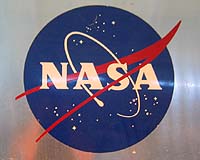 |
Washington DC (VOA) Oct 26, 2010 The United States is committed to facing the challenges that we find today where the benefits of space permeate almost every facet of our lives. The National Space Policy renews our pledge of cooperation in the belief that with strengthened international collaboration and reinvigorated U.S. leadership, all nations and peoples will find their horizons broadened, their knowledge enhanced, and their lives greatly improved. As part of an expanded emphasis on international cooperation in space activities, the U.S. will pursue transparency and confidence-building measures as a way to help prevent mishaps, misper-ceptions, and mistrust. "Such measures," said Frank Rose, U.S. Deputy Assistant Secretary of State for Arms Control, Verification and Compliance, "are one pragmatic approach to solving foreign policy problems through partnership and shared responsibility and offer an opportunity to promote the peaceful and responsible use of space." All space-faring nations face several critical challenges to their ability to operate safely and responsibly in space. Congestion in space is becoming an increasing problem. The United States is implementing approaches to mitigate orbital debris by promoting "best practices" for the sustainable use of space. Another challenge is to keep track of who is using the space environment, for what purpose, and under what environmental conditions. This kind of information is critical to dealing with the dangers of increased congestion in space and collision avoidance. The U.S. national space policy calls for expanded collaboration on the dissemination of orbital tracking information, including warnings of potential collision risks. Working together with other nations to share collision warning information will have the added benefit of improving spaceflight safety for governments and the private sector. Finally, it is important to promote responsible and peaceful behavior in space. For its part, the United States is committed to pursuing transparency and confidence-building measures that can enhance U.S. security and the security of its allies, friends, and space partners. "Partnership," said Deputy Assistant Secretary Rose, "implies shared responsibility - while other nations have the right to use and explore space, this right also entails responsibility. Furthermore, it cannot be the responsibility of the United States alone." Solving the challenges of orbital congestion, collision avoidance, and the free use of space for peaceful purposes are the responsibilities of all those who are engaged in space.
Share This Article With Planet Earth
Related Links NASA Space Tourism, Space Transport and Space Exploration News
 NASA Selects 215 Small Business Research And Technology Projects
NASA Selects 215 Small Business Research And Technology ProjectsWashington DC (SPX) Oct 19, 2010 NASA selected 215 proposals for negotiation of Phase II contract awards in the Small Business Innovation Research program, or SBIR. The selected projects have a total value of approximately $129 million. NASA will award the contracts to 162 small high technology firms in 35 states. The SBIR program works with NASA's mission directorates to competitively select ventures that address researc ... read more |
|
| The content herein, unless otherwise known to be public domain, are Copyright 1995-2010 - SpaceDaily. AFP and UPI Wire Stories are copyright Agence France-Presse and United Press International. ESA Portal Reports are copyright European Space Agency. All NASA sourced material is public domain. Additional copyrights may apply in whole or part to other bona fide parties. Advertising does not imply endorsement,agreement or approval of any opinions, statements or information provided by SpaceDaily on any Web page published or hosted by SpaceDaily. Privacy Statement |